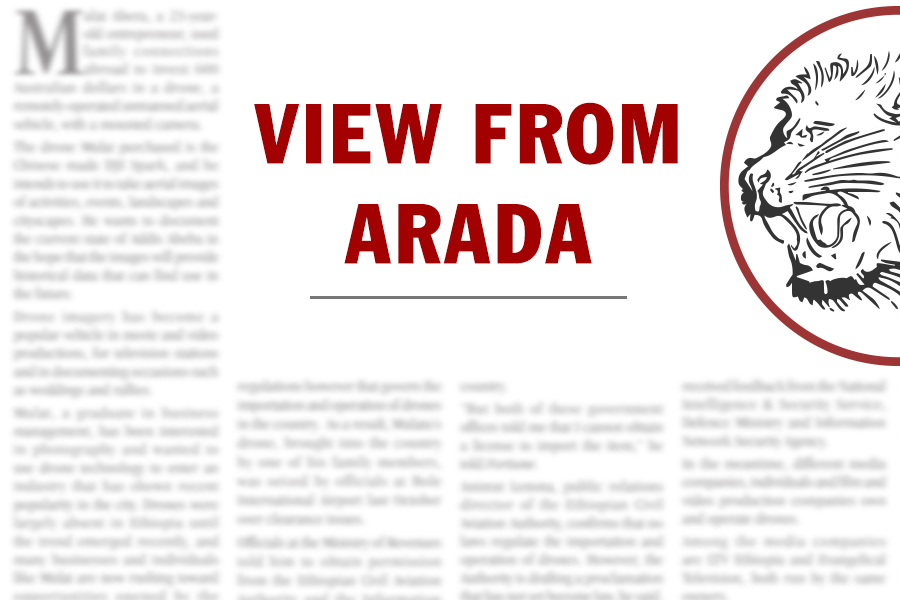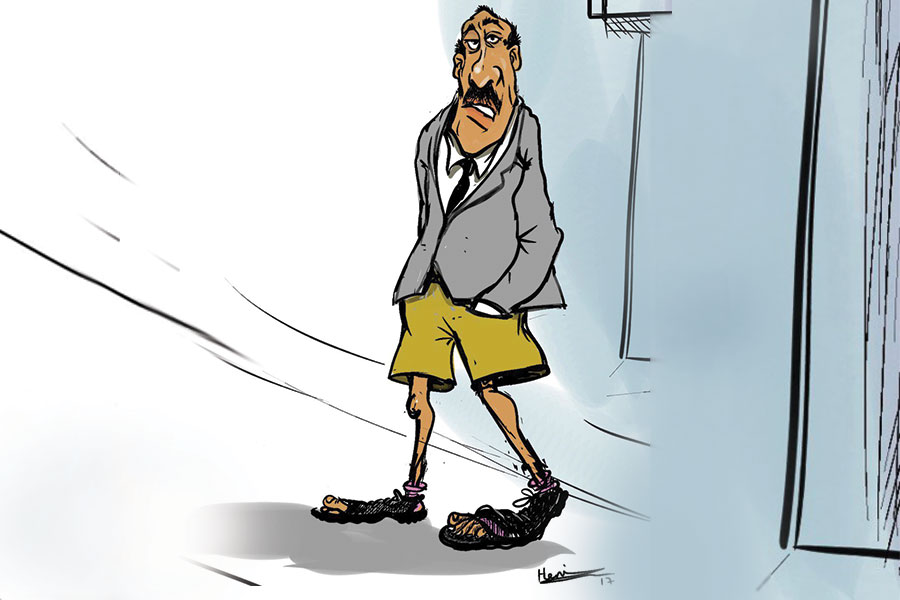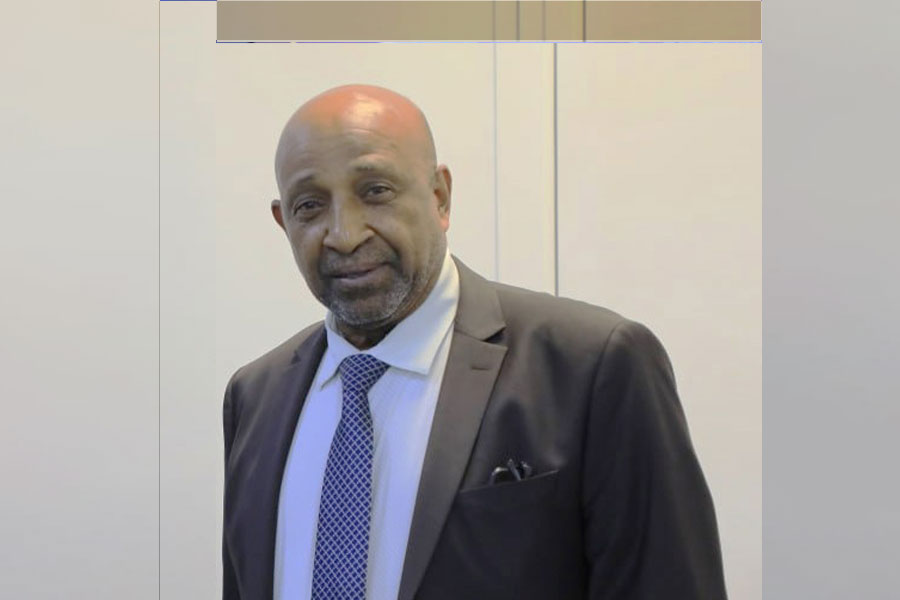
View From Arada | May 03,2024
Aug 30 , 2025
By Dennis Snower
If trust in the dollar falters, financial markets could react swiftly and collectively. As seen during past crises, only a minority of investors need to lose confidence for a self-fulfilling sell-off to begin. In such a scenario, US Treasury yields could surge, and the dollar’s decline could send shockwaves through global portfolios. In this commentary provided by Project Syndicate (PS), Dennis Snower, a research associate at the Harvard Human Flourishing Program, argued that alternatives are limited. Central banks and pension funds face a scramble for safety with few credible substitutes.
For decades, the Dollar's position as the world's leading reserve currency has provided the United States with extraordinary advantages in the ability to borrow at low interest rates, run large current-account deficits, and finance budget shortfalls by printing money without necessarily triggering inflation. But since the start of President Donald Trump's second term, warnings about the "end of America's exorbitant privilege" have grown into a steady drumbeat.
The concerns are well-founded. Trump's policies, from his attacks on the US Federal Reserve to his hands-off regulatory stance toward cryptocurrencies, are systematically undermining the Dollar's reserve-currency status. Losing the Dollar's primacy would invariably jeopardise the long-term health of the US economy.
But focusing solely on America's fading privilege is like noticing a few trees ablaze while missing the wildfire igniting behind them. The loss of the Dollar's reserve-currency status would reverberate far beyond America's borders, sending shockwaves throughout the global economy.
Financial markets, always on the lookout for potential risks, need only a critical mass of participants to believe that the threat is real for it to become so. Once enough investors begin selling a vulnerable asset, more follow.
Crucially, America's "exorbitant privilege" is not a tribute owed to it for being the world's leading superpower. It is simply a byproduct of how a reserve currency works. Like individuals, countries require a reliable store of value, a medium of exchange, and a unit of account. As foreign economies grow, so does their appetite for dollar-denominated assets such as US Treasuries and corporate bonds. This demand enables the US to run persistent current-account and trade deficits.
The US government's deficits are largely financed through the sale of Treasuries, prized worldwide as a safe-haven asset. Because much of that liquidity is absorbed by foreign holders, the Fed can purchase these Treasuries with newly created dollars without boosting inflation. Strong international demand for US debt also holds down domestic interest rates, as investors are willing to accept low yields in exchange for the safety of dollar-denominated securities.
To serve as a global reserve asset, a currency must be safe, liquid, stable, and widely accepted. This depends on seven key conditions.
First, the issuing country should maintain macroeconomic stability, with low inflation, sustainable public debt, and sound fiscal and monetary policies that assure investors and central banks that the currency will retain its value over time. The issuing country should have deep and liquid financial markets, offering safe and highly tradable assets, particularly sovereign bonds, capable of absorbing large cross-border flows. Government debt can be considered an asset only when investors believe it will be managed responsibly and repaid.
A politically independent central bank committed to price stability is also essential to a currency's credibility, particularly when monetary policies are transparent and anchored in rules. Reserve currencies should be freely tradable and exchangeable across borders with minimal restrictions. The judicial system should uphold the rule of law. In particular, it has to protect property rights, ensure that foreign investors can enforce contracts, and provide avenues for recourse to resolve disputes.
A reserve currency should be seen as a global public good rather than a tool for promoting national self-interest, a perception that hinges on constructive global leadership and active multilateral engagement. Lastly, the currency's issuer should be a trade and finance powerhouse, as established network effects are necessary to encourage widespread adoption.
Trump's policies have weakened each of these pillars of American economic dominance. The massive tax cuts at the heart of his grossly mislabeled "One Big Beautiful Bill Act," unaccompanied by any real spending restraint, are projected to add a trillion dollars to the national debt, jeopardising macroeconomic stability. Although demand for US Treasuries remains strong, mounting debt and the risk of default, exacerbated by Trump's use of the debt ceiling as political leverage, have eroded investor confidence.
At the same time, the Fed's independence has come under strain as Trump publicly pressured policymakers to slash interest rates and suggested replacing Jerome Powell, the Federal Reserve's chair, and other officials with political loyalists. Although capital controls were not imposed, the administration's threats to block Chinese stock listing and exclude adversaries from SWIFT have fueled uncertainty over future access.
Trump's use of executive authority to sanction foreign firms, freeze the central-bank assets of countries like Venezuela, demand a 15pc cut of the revenues from sales of advanced microchips to China, and impose high import tariffs on longstanding allies has cast further doubt on US policy credibility. As a result, allies are exploring euro- or renminbi-based alternatives, and some central banks have begun diversifying away from dollar holdings toward gold and other assets, thereby accelerating the decline of the dollar.
If doubts about the Dollar's long-term reliability are allowed to take hold, the reserve-currency realignment will be neither gradual nor orderly. The more probable outcome is financial panic, since expectations of currency shifts tend to be self-fulfilling. If investors expect the Dollar to fall, they will sell dollar assets to avoid losses. This, in turn, will drive the Dollar down, validating the initial fear.
The faster the Dollar falls, the more urgently others will seek to exit their positions. Major central banks and pension funds could rapidly shift reserves into gold, euros, or renminbi, pushing up Treasury yields as buyers demand higher returns to offset increased risk. A falling Greenback could also trigger margin calls on leveraged dollar trades, forcing funds and banks with considerable exposure to liquidate other assets, spreading instability across global markets.
If Trump continues to impose aggressive tariffs and seize foreign-held assets, rivals like the 10-member BRICS+ group of major emerging economies may openly abandon the Dollar. This could set off massive foreign-exchange-reserve shifts and a global scramble for non-dollar safe havens.
Yet, the alternative safe-haven bond markets, primarily Germany, Switzerland, and Japan, are far too small to absorb the enormous capital currently concentrated in dollar assets, particularly US Treasuries, which total 28 trillion dollars, with about 8.5 trillion dollars held by foreigners. The UK gilt market is similarly undersized.
In Europe, the absence of a fiscal union and a safe-asset equivalent to US Treasuries not only constrains the supply of Eurobonds but also undercuts eurozone cohesion. China's sovereign-bond market remains limited as a reserve haven due to capital controls, a lack of full currency convertibility, political opacity, and weak legal protections. To be sure, sovereign and quasi-sovereign bonds, issued by institutions such as the European Investment Bank, the World Bank, the Asian Development Bank, and Germany's KfW, could gain some reserve status due to their reliability and multilateral backing. But that is more a long-term prospect than an immediate solution.
Large corporations with strong balance sheets, such as Apple or Microsoft, may serve as quasi-sovereign alternatives. But private credit carries substantial risk, especially in times of global financial stress, and cannot be a substitute for sovereign liquidity. Bitcoin and "digital gold" are viewed by some as hedges against fiat-currency risk, but their high volatility, along with regulatory uncertainty and scalability issues, prevent them from absorbing substantial reserve flows.
Other options are equally limited. Central banks, particularly those of China, Russia, and Turkey, have been accumulating gold reserves, but the global supply of gold is finite. While special drawing rights (the International Monetary Fund's reserve asset) could become more prominent if the Dollar's credibility collapses, SDRs are not market-traded assets, as their liquidity is centrally managed and politically contested. Central bank digital currencies (CBDCs), such as China's e-CNY and the proposed digital euro, could eventually serve as channels for cross-border liquidity once they are interoperable and widely adopted. But that is unlikely in the short term.
In short, if confidence in the Dollar as the world's reserve currency begins to falter, the resulting realignment will likely resemble a frantic scramble for safety, with no true alternative readily available. Such a panic could fracture today's integrated global financial system into regional or bloc-based networks.
This instability could be exacerbated by cryptocurrency markets, which operate with far less oversight than traditional financial markets and are set to be even less regulated under the current US administration. Most cryptocurrencies are far more volatile than fiat currencies or traditional safe assets, making them unsuitable as a stable store of value.
Deregulated cryptocurrency markets, particularly those built around stablecoins, pose growing systemic risks to US Treasury markets. Because stablecoins are typically pegged to the Dollar, their issuers hold large reserves in short-term, highly liquid assets, primarily Treasuries and cash or cash equivalents. A sharp break from the dollar peg or a sudden loss of confidence in a major stablecoin could lead to a large-scale liquidation of Treasuries to meet redemption demands, a crypto version of a bank run. Such a sell-off could drain liquidity from Treasury markets, distort short-term yields, and cause spillovers into other asset classes, including mortgages and corporate bonds.
Cryptocurrencies, especially stablecoins and CBDCs, could challenge the US dollar's dominance in global payment flows. If widely adopted, they would divert transaction volumes away from dollar-based systems such as correspondent banking and SWIFT. But, without coordinated international regulation, crypto-based payment systems risk fragmenting financial oversight, obscuring capital flows, facilitating money laundering and terrorism financing, and restricting smaller economies' ability to manage their monetary policies.
The growing use of cryptocurrencies in cross-border settlements could also increase exposure to cyberattacks and network disruptions. Their use for sanctions evasion, illicit transactions, and tax avoidance is already chipping away at the Dollar's role in the shadow-banking system, with profound implications for sanctions enforcement and economic stability.
As trade barriers rise and foreign-exchange volatility intensifies, financial flows, reserve holdings, payment systems, and capital markets are becoming increasingly confined to competing regional blocs. Financial fragmentation also impedes currency convertibility, disrupts SWIFT-style messaging systems, and complicates regulatory coordination. These frictions create exchange-rate mismatches, legal uncertainty, and delays in cross-border payments.
When commerce and finance are divided between spheres of interest, capital is allocated according to geopolitical loyalties rather than market fundamentals. The result is a disjointed global economy characterised by slower growth, reduced productivity, and higher capital costs, especially for non-aligned developing economies.
Fragmentation curtails the ability of global institutions such as the IMF, the World Bank, the World Trade Organisation, and the Bank for International Settlements to maintain stability, coordinate crisis responses, and establish universal standards. As a result, more responsibility is being shifted to regional bodies, such as the Asian Infrastructure Investment Bank.
As countries redirect reserves toward regional alternatives, global liquidity could shrink while risk premiums surge. In this environment, competing blocs are more likely to adopt beggar-thy-neighbour policies, including competitive devaluations and export controls. Escalating rivalries over currency dominance, reserve status, and payment systems will increase the weaponisation of financial tools, such as sanctions, capital controls, and reserve seizures, thereby heightening the risk of instability and prolonged economic downturns.
It gets worse. As economic interdependence unravels, with deepening geopolitical divisions inevitably accelerating the creation of separate clearing systems, digital currencies, and regional trade systems, the loss of key restraints on armed conflict will increase the likelihood of military confrontation.
Given the stakes, framing the Dollar's decline merely as the end of America's "exorbitant privilege" misses the larger story. The fate of the Greenback is not a parochial American concern but a global problem. If a fragile yet manageable equilibrium, underpinned by multilateral cooperation, gives way to financial balkanization, the coming decades will be defined by economic conflict and the constant threat of all-out war.
PUBLISHED ON
Aug 30,2025 [ VOL
26 , NO
1322]


View From Arada | May 03,2024

Viewpoints | Jul 29,2023

View From Arada | May 24,2025

Commentaries | Aug 18,2024

Viewpoints | Dec 19,2021

Radar | May 08,2021

Viewpoints | Nov 26,2022

Radar | Sep 10,2022

Radar | Feb 27,2021

Exclusive Interviews | Jan 07,2024

Photo Gallery | 141790 Views | May 06,2019

My Opinion | 134171 Views | Aug 14,2021

Photo Gallery | 132053 Views | Apr 26,2019

My Opinion | 130735 Views | Aug 21,2021

Dec 22 , 2024 . By TIZITA SHEWAFERAW
Charged with transforming colossal state-owned enterprises into modern and competitiv...

Aug 18 , 2024 . By AKSAH ITALO
Although predictable Yonas Zerihun's job in the ride-hailing service is not immune to...

Jul 28 , 2024 . By TIZITA SHEWAFERAW
Unhabitual, perhaps too many, Samuel Gebreyohannes, 38, used to occasionally enjoy a couple of beers at breakfast. However, he recently swit...

Jul 13 , 2024 . By AKSAH ITALO
Investors who rely on tractors, trucks, and field vehicles for commuting, transporting commodities, and f...

Aug 30 , 2025
For Germans, Otto von Bismarck is first remembered as the architect of a unified nati...

Aug 23 , 2025
Banks have a new obsession. After decades chasing deposits and, more recently, digita...

Aug 16 , 2025
A decade ago, a case in the United States (US) jolted Wall Street. An ambulance opera...

Aug 9 , 2025
In the 14th Century, the Egyptian scholar Ibn Khaldun drew a neat curve in the sand....

Aug 30 , 2025
At a high-profile event held at the Sheraton Addis last week, the launch of Dashen Ba...

Aug 30 , 2025 . By NAHOM AYELE
Ethio telecom, one of the long-standing state-owned monopolies, has publicly committe...

Aug 30 , 2025 . By NAHOM AYELE
Federal education officials have issued a stern warning to private colleges, where a...

Aug 30 , 2025 . By BEZAWIT HULUAGER
The Ethiopian Insurance Corporation (EIC) delivered a robust pre-tax profit of 1.98 b...